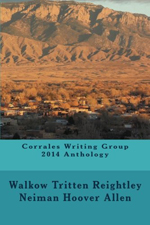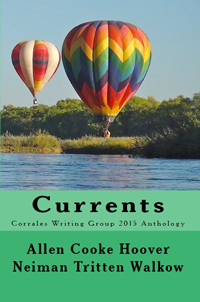This is part two of an interview with Corrales Writing Group, a closed group of six members who encourage each other in their individual writing journeys. Together they produce an annual anthology of essays and short pieces of fiction and memoir. The current group is made up of authors Christina Allen, Maureen Cooke, Sandi Hoover, Thomas Neiman, Jim Tritten, and Patricia Walkow. Their third anthology, Currents, was published in 2015. You can visit Corrales Writing Group on Facebook. To read the first part of the interview, go to “On Group Structure and Indie Publishing.”
Chris Allen lives in Corrales, New Mexico with her husband and a menagerie of animals. She prefers to write stories that spark a smile or a laugh.
My career involved technical writing—telling, not showing. The feedback from Corrales Writing Group pushes me to write in a way that provides the reader with imagery, not simply facts. In addition, as a procrastinator, the routine of twice monthly meetings has imposed a structure and rigor to my writing that enables me to complete stories that have rattled around in my head for years. I also learn how to improve my writing at every critique session, whether the work discussed is mine or that of another member. Ideas come to me from my life experience. In order to convert these ideas to text, however, I need deadlines as I work better under pressure. Also, as someone who has always worked with groups, I need activity around me. I have set a schedule to write twice a week at a local coffee shop where I concentrate solely on completing my stories to present to the group. I love to entertain, to tell stories, especially to provide people with a laugh or a smile. I also enjoy writing concisely and logically. I have no difficulty conveying facts and truth. However, moving past facts to creative imagery, embellishment, exaggeration, etc., has been difficult for me. I now have the benefit of the experiences of my fellow group members, and they have helped me to understand it is ok to be creative.
Maureen Cooke is originally from Bay City, Michigan. She began writing in second grade at St. Joseph’s School, under the tutelage of Sister Mary Earl.
I write every morning. I get up really early—somewhere between 4:30 and 5:30—when the world is still dark, when the animals are still asleep, and when I’m not distracted by other responsibilities. I’d say my greatest strength as a writer is being a word stylist. Any weaknesses come from self-doubt and resistance to write, both of which I overcome by writing early in the morning when I’m more apt to enjoy it and less apt to doubt my ability to do so. I’ve actually used writing as a type of therapy in the past; consequently, first-draft writing has taught me how to deal with the stress of life. Creating the first draft is probably my favorite part of the process, although I do enjoy every aspect of a project. Scenes involving a lot of people are the hardest for me to write, because I’m not sure the level of descriptive detail to include. I’ve known I was a writer since second grade when Sister Mary Earl first inspired me to write. She shared my work with the nuns in the convent, and that was the best encouragement I could have gotten.
 Sandi Hoover finds nature both entertaining and interesting, motivating her to write natural history essays to share her findings.
Sandi Hoover finds nature both entertaining and interesting, motivating her to write natural history essays to share her findings.
Having a support group whose members are both honest and kind in their assessment of each other’s writing is critical to growth for a beginning writer—at least that’s true for me. Before joining Corrales Writing Group, my writing was confined to travel journals and descriptive letters about trips. I loved writing interpretive trail guides for a nature sanctuary, and having the pleasure of painting word pictures of exotic places in my travel journals. Writing for deadlines has made me approach writing with more discipline. I still find it easier to write nature essays than fiction, but that is an area I intend to work on more. I’m still hesitant to use the term “writer” about myself, but I am thoroughly enjoying working with the writing group to improve my skills and learn from their expertise. I like creating images on paper best, and then reworking to get them the way I see them. I binge write, ignoring the yearning for a day or two and then devote hours at a stretch to typing furiously. Lots of rereading, lots of messing with minor changes. Scenes of emotional conflict between people are the hardest for me to write. Getting that right is difficult and painful. Those are still in progress and unseen by the writing group. Loving words and finding the right word to express a situation or emotion is a strength I can rely on. My writing weakness is in finding a balance between dialogue and action—just writing more is a requirement to learn how to do that. Writing has taught me that I can procrastinate without guilt. Seriously, it has made me look with interest, and more compassion, at people’s emotions and the way they are expressed in times of stress.
Tom Neiman has been writing since 2012 and has published four short stories and one mystery novella.
My first experience as a writer, if it counts, was writing administrative code while employed by the federal government. When laws changed, I wrote instructions for bureaucrats. Not very creative, I know. All that changed when I was invited to join Corrales Writing Group. The group helped me convert an 800-word summary into my first completed project (“The Leather Truths”) which was published in our 2013 anthology. I’ve learned to take a kernel of an idea and develop it into a story, prepare an outline, and move to the actual complex sentence work. I love creating detailed characters and their dialog. And I spend time researching those areas I have the least experience with. I enjoy doing the research and the writing, but I’m not much of a copy editor. Writing has taught me that an old dog can learn new tricks. Since I retired eight years ago, my passions have been creative writing and arboriculture. Given enough time, I can be an asset in both. For me, the hardest things to write are the subjects I haven’t tried, but I love to experiment. Sometimes my technique drives the writing group members crazy. What is the best advice I’ve received in my writing journey? To paraphrase the late Al Davis, the former owner of the Oakland Raiders professional football team, “Just write, baby.” I’d like to encourage others to get their thoughts and ideas down on any media. Write, audio-record, dictate to a computer, complex sentences or stream of consciousness. Don’t worry about editing or revision, and find some like- minded people to discuss your project with, either in person or over the Internet.
 Jim Tritten is a retired naval aviator living in Corrales, New Mexico with his Danish author/artist wife and five cats.
Jim Tritten is a retired naval aviator living in Corrales, New Mexico with his Danish author/artist wife and five cats.
My first writing for publication was for the high school newspaper. Can’t remember what motivated me, but I suspect it was to have a venue for being funny. Or just getting attention. Or perhaps being with the good-looking girls on the newspaper staff. At work I learned I could write in an environment where very few had that skill. Writing was a way to stand out and make contributions that were frequently recognized, and I soon got paid to do what I liked to do. When I retired, more than a few people suggested I break free of non-fiction and move into other genres. Then I realized it was an excellent way to process trauma and PTSD. That is now my primary motivation to write. When I switched from academic writing to fiction I had a lot to learn. Initially I wrote memoir. I used all of my life experiences, my diagnosis of PTSD, flying, etc. and blended that knowledge with what I needed to learn about writing in new genres for different audiences. I have learned that writing about what you know does not just mean about things that you did. More importantly it means feelings that you have experienced and can describe so that someone else can experience them as well. When I worked and wrote non-fiction, I learned discipline and how to complete tasks. This was a leg up when I stopped working and shifted to totally different types of writing. Learning about emotion, and then being able to describe it, were integral steps in the PTSD recovery process taught by the VA. The next step was writing words on paper that would make the reader feel, see, etc. exactly what was going on inside an individual when faced with a variety of circumstances. When I learned I could do that, I felt good. My advice to other writers is to take every opportunity to write, even if it isn’t an article or book or something that can be published. Be a recording secretary for a volunteer organization—it will teach you good skills about summarizing what happened. Write experimental pieces that stretch your skills and abilities. My recent experiment in horror was an eye opener. And above all, don’t stop writing until someone pries the pen from your cold, dead hands.
Pat Walkow writes fiction, humor, satire, and non-fiction. Her favorite is satire, but she’ll try any genre.
Writing is something I’ve always enjoyed. I think I was seven when I knew I wanted to write. I prefer creating to any other aspect of a writing project. Unfortunately, most of my inspiration comes at night. I often find myself awake in my pajamas writing in the wee hours. But I have learned if I have an idea, to jot it down. The kind of scenes I find most difficult to write are erotic scenes, mostly because I think it is overdone in print, and I prefer subtlety. Often it is not even necessary. The best advice I’ve received in my writing journey is not to be afraid to try different genres, to take chances. Having written in a corporate environment for a while, it is a pleasure to have a voice that is my own and not a mouthpiece for another entity. Writing has taught me that it’s okay to experiment with writing and okay to seek the opinions of others. The Corrales Writing Group has made me a better writer and exposed me to new ideas and perspectives. I’ve also learned that a blank piece of paper (or a blank computer screen) is nothing to be afraid of. It is a canvas for the writer and can become anything you imagine.
 KL Wagoner (writing as Cate Macabe) is the author of This New Mountain: a memoir of AJ Jackson, private investigator, repossessor, and grandmother. She has a new speculative fiction blog at klwagoner.com and writes about memoir at ThisNewMountain.com.
KL Wagoner (writing as Cate Macabe) is the author of This New Mountain: a memoir of AJ Jackson, private investigator, repossessor, and grandmother. She has a new speculative fiction blog at klwagoner.com and writes about memoir at ThisNewMountain.com.



























Leave a Reply